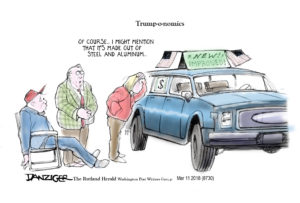Internet-Connected Cars Accelerate Down Data-Collection Highway
By 2020, about 75 percent of cars sold will be plugged into the internet. While there are some benefits, surveillance is a concern.SAN FRANCISCO—That holiday trip over the river and through the woods to grandmother’s house could turn into a nice little gift for automakers as they increasingly collect oodles and oodles of data about the driver.
Automakers are collecting valuable pieces of information thanks to the internet connections, cameras and sensors built into most vehicles in recent years. The online access makes it possible for cars to be unlocked remotely if the keys are lost. It’s how safety features can be upgraded wirelessly and maintenance schedules adjusted based on performance.
But these digital peepholes are also offering a windshield-size view of people’s lives. That’s creating the potential for intrusive marketing pitches and government surveillance.
No serious incidents have occurred in the United States, Europe and Japan, but a red flag has already been raised in China, where automakers have been sharing location details of connected cars with the government.
“We are not that far away from when 100 percent of all new cars will come equipped with data modems,” Navigant Research analyst Sam Abuelsamid predicted. “Having the potential to collect more data about people in their cars means there is going to be potential for abuses, too.”
Here are some key questions about the auto industry’s acceleration down the data-collection highway:
Q: What kind of cars collect data?
A: In 2016, about one in every five cars sold globally could be plugged into the internet, according to BI Intelligence. By 2020, about three out of every four cars sold will be online.
So if you are driving a 2009 Toyota Corolla, you probably only have to worry about the tracking and data collection being done by the smartphone resting on the cup holder. But as those older models go to the scrapyard, it will become difficult to avoid a vehicle set up for gathering data that will be sent to automakers.
Q: Which automakers are leading the way in this trend?
A: General Motors accounted for 46 percent of connected-car shipments last year, according to the market research firm Counterpoint. They’re followed by BMW (20 percent), Audi (14 percent) and Mercedes Benz (13 percent). In addition, Tesla’s Model S sold since 2012 all come with connectivity. The firm said the biggest markets for connected car sales last year were China (32 percent), the United States (13 percent), Germany (11 percent) and the United Kingdom (9 percent).
Q: Do I own data that’s collected?
A: Under U.S. law, it’s unclear.
Drivers own the data stored in the “black boxes” that monitor vehicles in a crash. Police and insurers need a driver’s consent — or a court order — to get that data. But there are no laws addressing data collected by automakers through vehicle internet connections.
So far, few automakers will share their data in the United States without the owners’ consent, Abuelsamid said. Twenty companies — including GM, Toyota, Ford, Hyundai and Mercedes-Benz — signed a voluntary agreement in 2014 to get permission before sharing a driver’s location, health or behavior with third parties. The agreement doesn’t require approval from drivers for data to be shared with emergency workers or for internal research.
One of the most notable exceptions is electric car maker Tesla Motors, which has released data publicly to reveal — sometimes within hours of a crash — how fast a driver was traveling and whether the company’s semi-autonomous Autopilot system was engaged after a collision.
Q: In what ways are automakers passing along data when drivers allow it to be shared?
A: They’re giving the data to insurers to determine the premiums that should be charged, if a driver consents. This could be good if data indicates drivers are cautious, adhere to speed limits and seldom log lots of miles. But insurance premiums could jump for drivers who are prone to speeding or frequent hard braking — all of which could be interpreted as raising the risks for accidents. Insurers would also know whether your seat belt is fastened.
Q: Can I stop an automaker from collecting my data?
A: Most automakers let owners decline, or opt out of, data collection, but that’s usually buried in the fine print. Otherwise, permission is assumed. Also, unlike smartphones, some data collection may be required to ensure that cars operate safely and can receive essential software updates. That’s especially true as more vehicles come with features such as semi-autonomous driving. And it could be necessary in order to have self-driving vehicles.
Q: Should I be worried about automakers using my data in ways that are annoying or compromise my privacy?
A: Probably, if what has happened with smartphones is a reliable gauge.
As automakers collect more data about drivers, they’re more likely to look for ways to profit. The built-in display screens and mapping software would seem to be ideal spots for posting advertisements, similar to what Google, Facebook, Amazon and many other internet companies already do.
The business consultancy McKinsey has estimated automotive data could be worth $450 billion to $750 billion worldwide by 2030. Ford Motor CEO Jim Hackett may have foreshadowed what’s coming as he boasted in a recent interview about how much the automaker already knows about its customers who get their loans through its financial services division. All the lending information has allowed Ford to learn how much money people, where they live, where they live and whether they are married.
“We’ve never ever been challenged on how we use that,” Hackett told a Freakonomics podcast last month.
___
AP Auto Writer Tom Krisher in Detroit contributed to this story.
Your support matters…
Independent journalism is under threat and overshadowed by heavily funded mainstream media.
You can help level the playing field. Become a member.
Your tax-deductible contribution keeps us digging beneath the headlines to give you thought-provoking, investigative reporting and analysis that unearths what's really happening- without compromise.
Give today to support our courageous, independent journalists.








You need to be a supporter to comment.
There are currently no responses to this article.
Be the first to respond.